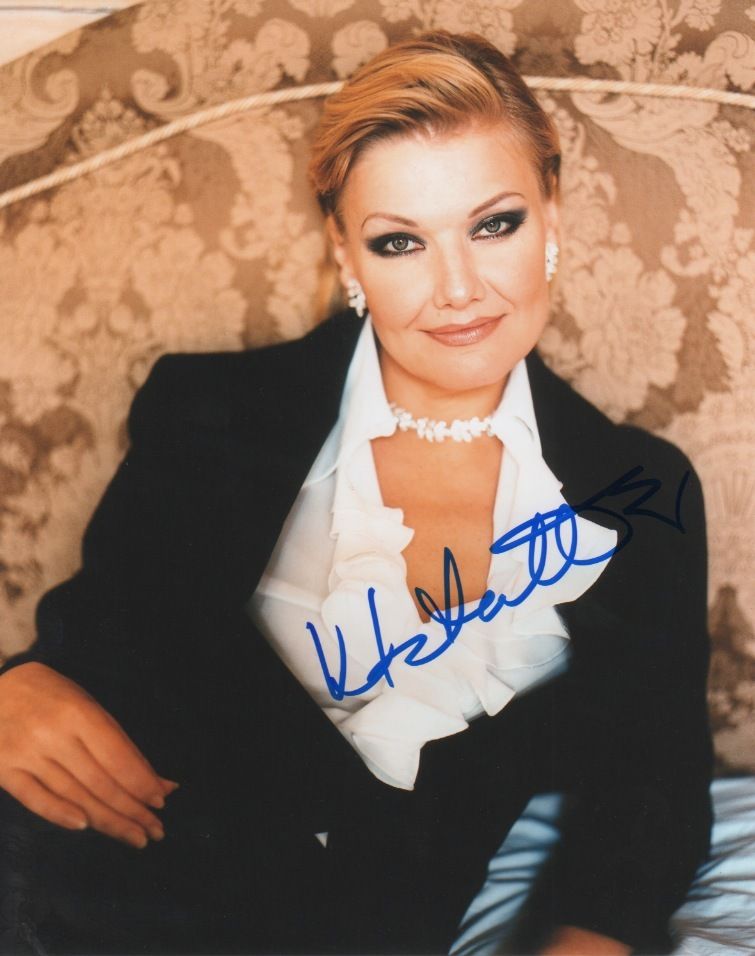

|
Born in Somero, Finland, on September 5, 1960, Karita Mattila graduated 1983 from the Sibelius Academy in Helsinki, where she studied singing with Liisa Linko-Malmio. She then continued her studies with Vera Rózsa in London. Also in 1983, Mattila won the first Cardiff Singer of the World competition.
In 1994, she made her Spanish debut as Tatyana in Tchaikovsky's Eugene Onegin in Madrid, and 1996 debuts in Paris in Wagner's Lohengrin, Verdi's Don Carlos. Mattila has won Grammy Awards for "Best Opera Recording" for Die Meistersinger von Nürnberg in 1998 and for Jenůfa in 2004. [Vis-à-vis the recording shown at right, see my interviews with Anja Silja, Jerry Hadley, and Bernard Haitink.] She was awarded the Evening Standard Ballet, Opera and Classical Music Award for “Outstanding Performance of the Year” in 1998 for her performance of Elisabeth in Don Carlos at the Royal Opera House. In 2001 The New York Times chose Karita Mattila as the best singer of the year for her performance in Fidelio at the Metropolitan Opera, and in the same year she was nominated for the Laurence Olivier Award “Outstanding Achievement in Opera”. Mattila's 2004 New York performances in Salome and subsequent Káťa Kabanová inspired the New York press to write: "When the history of the Metropolitan Opera around the time of the millennium is written, Karita Mattila will deserve her own chapter." In 2005, she was named Musician of the Year 2005 by Musical America, which describes her "the most electrifying singing actress of our day, the kind of performer who renews an aging art form and drives the public into frenzies." BBC Music Magazine named Mattila as one of the top 20 sopranos of the recorded era in 2007. Worldwide audiences saw Mattila in Manon Lescaut live in movie theaters in 2008. The Metropolitan's Salome and Tosca were seen live in High Definition worldwide in 2008 and 2009, respectively. In 2010 at Opéra National de Lyon, Mattila created the role
of Émilie du Châtelet in Kaija Saariaho's monodrama Émilie,
which was dedicated to her.
|
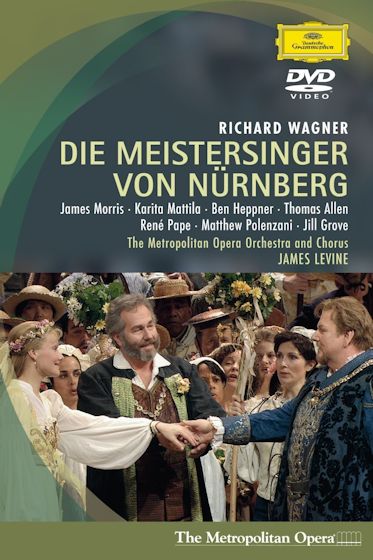 This interview with soprano Karita Mattila was held early in her career,
in January of 1991, when she was appearing with Lyric Opera of Chicago
in her second Mozart role, Pamina in The Magic Flute. [The
cast included Jerry Hadley, Sumi Jo, Timothy Nolen, Robert Lloyd, and Thomas Stewart. The
Conductor was Gustav Kuhn in the August Everding production.
Two years previously, Mattila had sung Donna Elvira in Don Giovanni
with Samuel Ramey, Carol
Vaness, Claudio Desderi, Gösta Winbergh,
Marie McLaughlan, and John Macurdy, conducted
by Semyon Bychkov in the Ponnelle production. She would later sing
Eva in Die Meistersinger (performances and audio recording) with
the Chicago Symphony, and José van Dam,
Ben Heppner, Alan Opie, René Pape, led by Sir Georg Solti. (Names
which are links refer to my interviews elsewhere on this website.)]
This interview with soprano Karita Mattila was held early in her career,
in January of 1991, when she was appearing with Lyric Opera of Chicago
in her second Mozart role, Pamina in The Magic Flute. [The
cast included Jerry Hadley, Sumi Jo, Timothy Nolen, Robert Lloyd, and Thomas Stewart. The
Conductor was Gustav Kuhn in the August Everding production.
Two years previously, Mattila had sung Donna Elvira in Don Giovanni
with Samuel Ramey, Carol
Vaness, Claudio Desderi, Gösta Winbergh,
Marie McLaughlan, and John Macurdy, conducted
by Semyon Bychkov in the Ponnelle production. She would later sing
Eva in Die Meistersinger (performances and audio recording) with
the Chicago Symphony, and José van Dam,
Ben Heppner, Alan Opie, René Pape, led by Sir Georg Solti. (Names
which are links refer to my interviews elsewhere on this website.)] 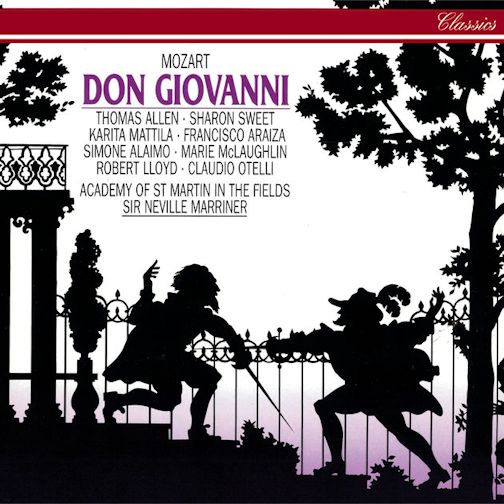 KM: Yes, groupings! My voice would have been very
suitable for Pamina, but they thought my voice was too big, and I’m
too big. Everything was wrong in me to fit in. I had done
Queen of the Night at the age of twenty, so they just didn’t think
I could swap into it. Somebody said to me a very interesting thing,
that when you are among young singers, it’s easier to find a Queen of
the Night than it is finding Pamina, because Pamina has its difficulties,
and it’s such a rich role. You can do it in so many ways. I
love to sing it now, and I would love to sing it in the future.
But Eva is also characteristically close to Pamina, if you have the voice
to be able to spread it out till the last quintet, and then pull back
again for the most lyrical scenes with Sachs. It’s such a variety
that you can play with it. You can find new things, and you can
do these two roles at the same time. I think you can, and I hope
so. I want to believe I can! [Laughs]
KM: Yes, groupings! My voice would have been very
suitable for Pamina, but they thought my voice was too big, and I’m
too big. Everything was wrong in me to fit in. I had done
Queen of the Night at the age of twenty, so they just didn’t think
I could swap into it. Somebody said to me a very interesting thing,
that when you are among young singers, it’s easier to find a Queen of
the Night than it is finding Pamina, because Pamina has its difficulties,
and it’s such a rich role. You can do it in so many ways. I
love to sing it now, and I would love to sing it in the future.
But Eva is also characteristically close to Pamina, if you have the voice
to be able to spread it out till the last quintet, and then pull back
again for the most lyrical scenes with Sachs. It’s such a variety
that you can play with it. You can find new things, and you can
do these two roles at the same time. I think you can, and I hope
so. I want to believe I can! [Laughs] 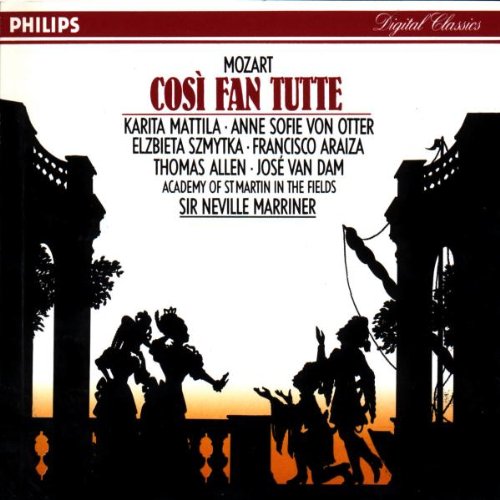 BD: Would you ever do Susanna?
BD: Would you ever do Susanna? 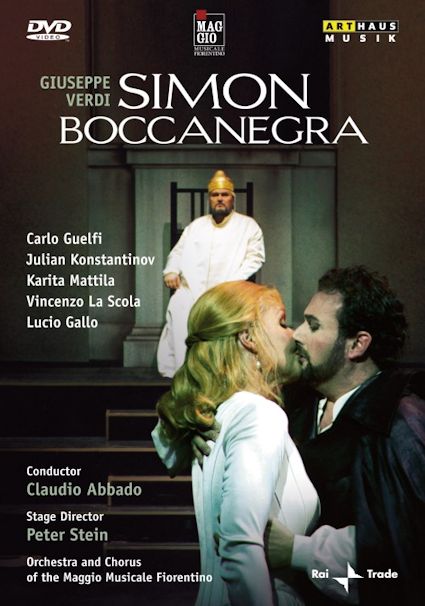 BD: You’ve mentioned that you like
some of these roles because the music dictates in your voice what
you can sing. Do you like all of the characters that you have
to sing?
BD: You’ve mentioned that you like
some of these roles because the music dictates in your voice what
you can sing. Do you like all of the characters that you have
to sing? 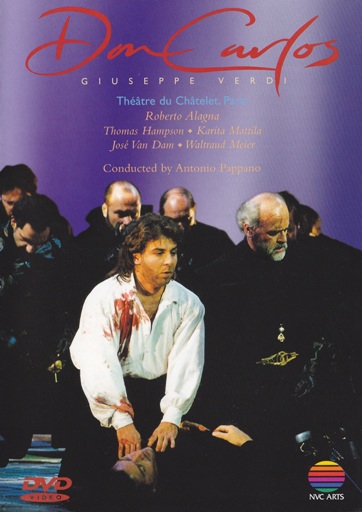 BD: Which role was that?
BD: Which role was that? 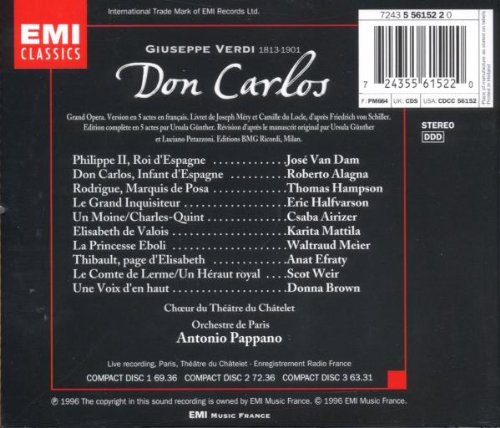 KM: It was Amelia in Simon Boccanegra,
and it gave me a lot of encouragement and self-assurance for trying
to find other things in the Italian repertoire as well. I love
doing Amelia, so now I have gotten the scores for certain Italian roles
that I would be very interested in trying, and then seeing how they would
fit, like Desdemona, and Elisabetta in Don Carlos, and things like
that.
KM: It was Amelia in Simon Boccanegra,
and it gave me a lot of encouragement and self-assurance for trying
to find other things in the Italian repertoire as well. I love
doing Amelia, so now I have gotten the scores for certain Italian roles
that I would be very interested in trying, and then seeing how they would
fit, like Desdemona, and Elisabetta in Don Carlos, and things like
that. 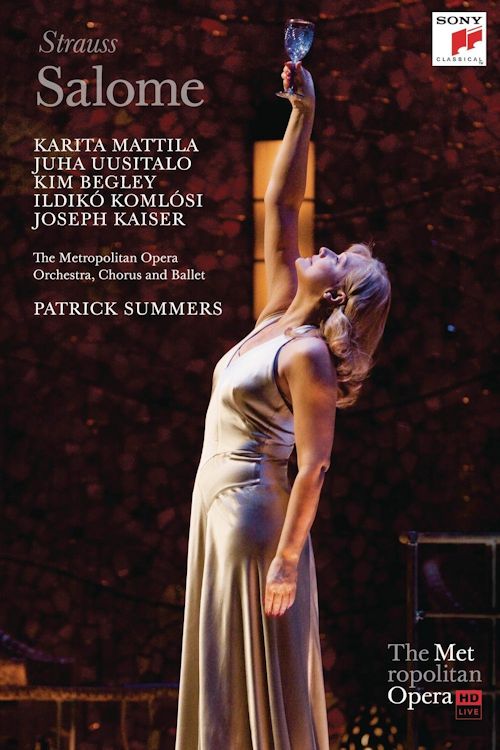 KM: It’s probably hard to separate. Part of both
things are happening because you are combining the voice
— the singing and the saying — with
this music, and since you have to express so much in your own voice, you
must become partly this character for the couple of hours that you are
in this character. You have to be able — or
at least you have to try — to concentrate.
‘Concentration’ is about just forgetting everything else that would
occupy your mind, and reminding yourself that this is not really me.
You have to rid yourself of everything else, and just become this person.
But in that process, because you have to pick up the ideas, sometimes
it’s harder to concentrate, and then it helps to analyze and find hints
for yourself about the character. Then by thinking of them, it’s easier
for you to change your appearance, or your gestures, or your physics, or
your breath. It’s about the way you live to
become that character. It’s difficult to explain... I think I would
sound just as unclear if I tried to explain this in Finnish because it
is so difficult to explain! [Both laugh] But it involves these
two elements — to become this character, and to portray
that character. In a way you are only portraying it,
since you are an actor or an actress, and how good you do it just shows
how able and flexible you are as an actor. But the music helps
us so much. To be able to use your voice is a great help.
Sometimes we cannot fake it because you have this gorgeous music.
KM: It’s probably hard to separate. Part of both
things are happening because you are combining the voice
— the singing and the saying — with
this music, and since you have to express so much in your own voice, you
must become partly this character for the couple of hours that you are
in this character. You have to be able — or
at least you have to try — to concentrate.
‘Concentration’ is about just forgetting everything else that would
occupy your mind, and reminding yourself that this is not really me.
You have to rid yourself of everything else, and just become this person.
But in that process, because you have to pick up the ideas, sometimes
it’s harder to concentrate, and then it helps to analyze and find hints
for yourself about the character. Then by thinking of them, it’s easier
for you to change your appearance, or your gestures, or your physics, or
your breath. It’s about the way you live to
become that character. It’s difficult to explain... I think I would
sound just as unclear if I tried to explain this in Finnish because it
is so difficult to explain! [Both laugh] But it involves these
two elements — to become this character, and to portray
that character. In a way you are only portraying it,
since you are an actor or an actress, and how good you do it just shows
how able and flexible you are as an actor. But the music helps
us so much. To be able to use your voice is a great help.
Sometimes we cannot fake it because you have this gorgeous music.
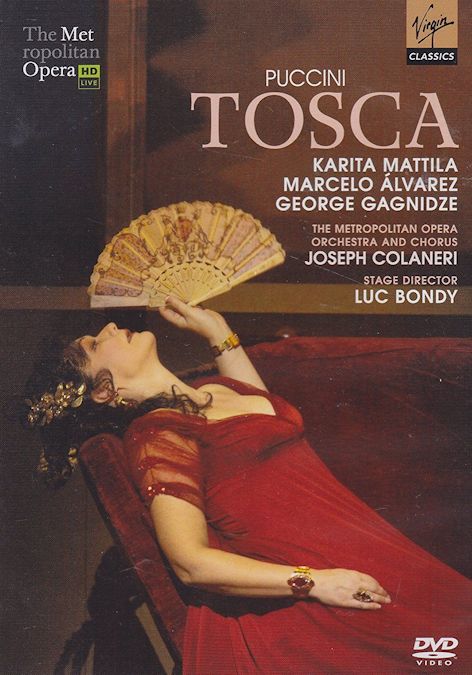 BD: Oh, ten or fifteen years from now. It’s a very
heavy part.
BD: Oh, ten or fifteen years from now. It’s a very
heavy part.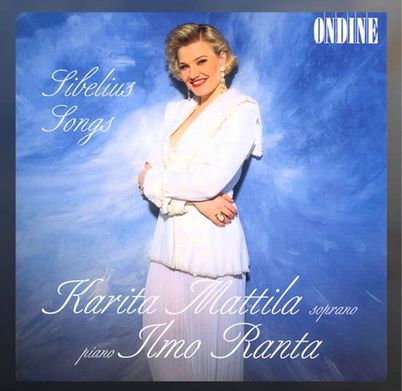 BD: Then why did you go into opera if you found it boring?
BD: Then why did you go into opera if you found it boring?
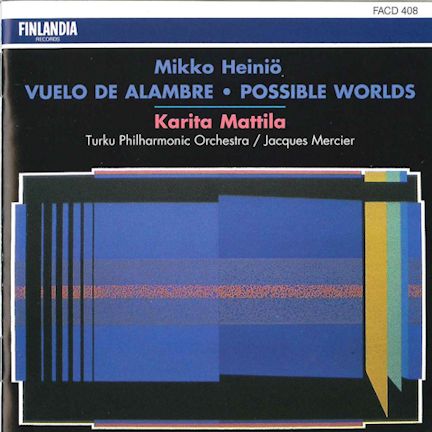 BD: So far, you’ve recorded a recital, and some Mozart
operas, plus the new Freischütz...
BD: So far, you’ve recorded a recital, and some Mozart
operas, plus the new Freischütz...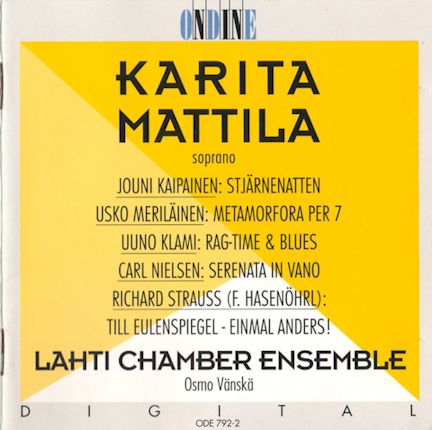 KM: Yes, and I’m also recording some modern Finnish music
for a national recording company in Finland, which is also very interesting.
I have done Sallinen, and I’m going to do, this year, two different
recordings by Mikko Heiniö and Jouni Kaipainen, two young Finnish
composers.
KM: Yes, and I’m also recording some modern Finnish music
for a national recording company in Finland, which is also very interesting.
I have done Sallinen, and I’m going to do, this year, two different
recordings by Mikko Heiniö and Jouni Kaipainen, two young Finnish
composers.
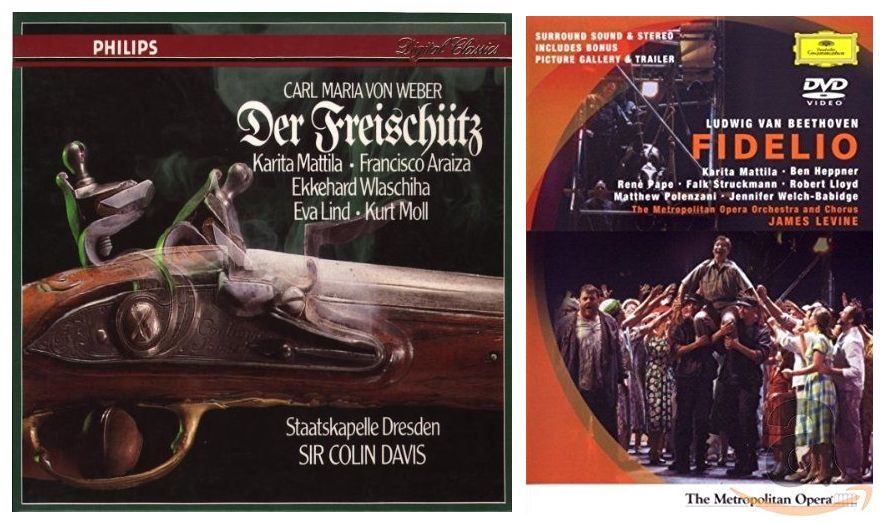
See my interviews with Kurt Moll, and Duane Schuler (Lighting
Designer of the Fidelio)
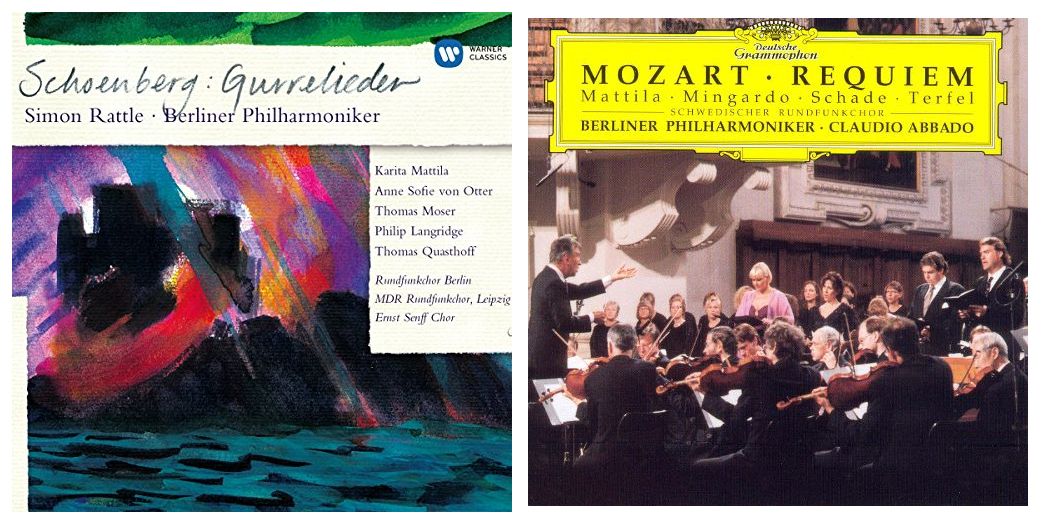
See my interviews with Thomas Moser, and Michael Schade
© 1991 Bruce Duffie
This conversation was recorded at her hotel in Chicago on January 23, 1991. Portions were broadcast on WNIB the following year, and again in 1995 and 2000. This transcription was made in 2018, and posted on this website at that time. My thanks to British soprano Una Barry for her help in preparing this website presentation.
To see a full list (with links) of interviews which have been transcribed and posted on this website, click here.
Award - winning broadcaster Bruce Duffie was with WNIB, Classical 97 in Chicago from 1975 until its final moment as a classical station in February of 2001. His interviews have also appeared in various magazines and journals since 1980, and he now continues his broadcast series on WNUR-FM.
You are invited to visit his website for more information about his work, including selected transcripts of other interviews, plus a full list of his guests. He would also like to call your attention to the photos and information about his grandfather, who was a pioneer in the automotive field more than a century ago. You may also send him E-Mail with comments, questions and suggestions.